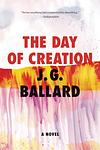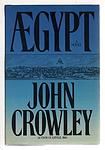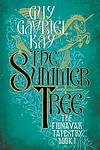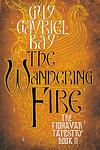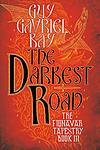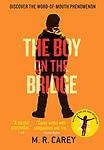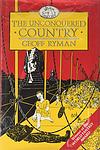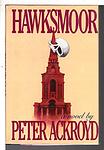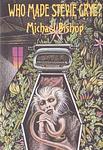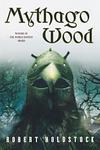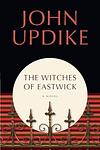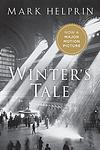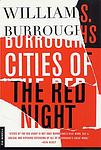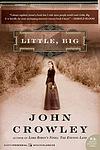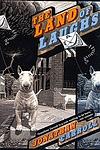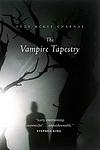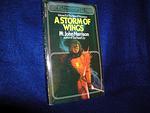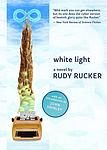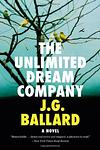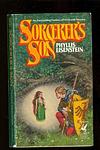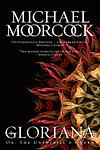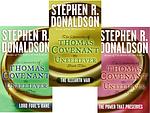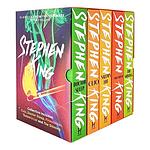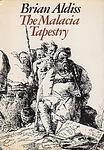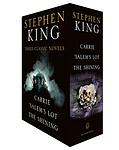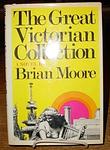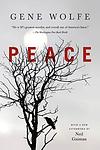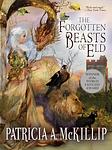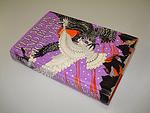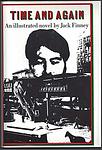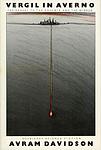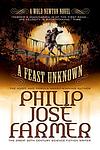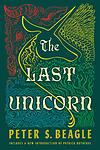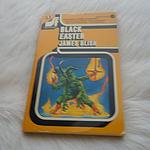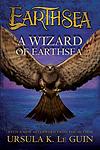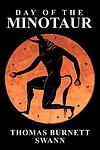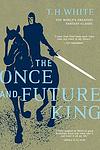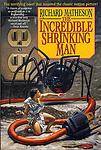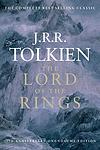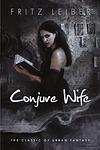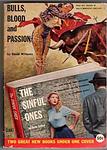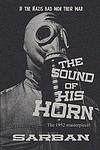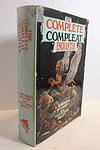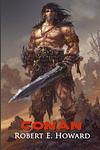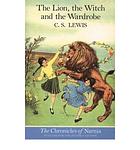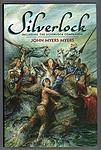Modern Fantasy: The 100 Best Novels
This is one of the 284 lists we use to generate our main The Greatest Books list.
-
The Day Of Creation by J. G. Ballard
In this novel, a restless scientist, driven by the desire to bring change to a parched, war-torn African country, inadvertently discovers a vast river where there was none before. His initial hopes for this miraculous waterway to become a force for good quickly sour as various factions vie for control, and the river itself becomes a source of chaos and destruction. As the protagonist becomes increasingly obsessed with the river, his journey turns into a surreal and perilous adventure, reflecting on the destructive impact of human ambition and the unpredictable power of nature.
-
Aegypt by John Crowley
The novel explores the intertwining lives of several characters, primarily that of a historian who becomes obsessed with the alternative histories and esoteric knowledge of the Renaissance period. As he delves deeper into his research, he begins to question the nature of history, reality, and the possibility of there being more than one true history of the world. The narrative weaves together personal transformation, magical occurrences, and the pursuit of hidden truths, set against the backdrop of both contemporary America and historical Europe, challenging the reader's perception of reality and the boundaries between fact and fiction.
-
The Summer Tree by Guy Gavriel Kay
This fantasy novel is the first in a series that weaves a tale of five university students from Toronto who are transported to a magical world called Fionavar. Invited as guests to witness the celebration of a pivotal anniversary, they soon find themselves embroiled in a struggle against an ancient evil that threatens the very fabric of all worlds. Central to the story is the Summer Tree, a sacred object of sacrifice and rebirth, where one of the students must endure a harrowing trial that will affect the fate of both Fionavar and their own world. The narrative blends myth, legend, and personal growth, as each character confronts their destiny and the complex moral choices of a world filled with gods, power, and enchantment.
-
The Wandering Fire by Guy Gavriel Kay
In this fantasy novel, a group of young men and women from our own world find themselves transported to a realm where myth and magic reign. They become embroiled in a desperate struggle to fulfill an ancient prophecy and combat a dark sorcery that threatens to engulf both worlds. As they journey through this enchanted land, they encounter legendary figures and creatures, and must come to terms with their own destinies. With the fate of two worlds hanging in the balance, they must harness their newfound abilities and face the malevolent force that seeks to extinguish the light of both the realms they have come to cherish.
-
The Darkest Road by Guy Gavriel Kay
In the epic conclusion to a high fantasy trilogy, a group of diverse characters face the ultimate battle against an ancient evil that threatens both their magical world and the very fabric of reality. As the forces of light and darkness prepare for a final confrontation, the heroes must grapple with personal sacrifices, complex moral dilemmas, and the weight of destiny. Their journey is fraught with loss, love, and the struggle to maintain hope in the face of overwhelming darkness. The narrative weaves together themes of power, redemption, and the enduring human spirit, culminating in a climactic resolution that will determine the fate of their world and the lives of all who inhabit it.
-
The Bridge by Iain Banks
The novel is a surreal and complex tale that weaves together multiple narratives and genres, centered around a man who awakens with amnesia on a massive, never-ending bridge that spans an entire world. As he tries to recover his memories and understand his place within this bizarre and sprawling structure, the story delves into his past life, exploring themes of identity, mental health, and the nature of reality. The bridge itself serves as a metaphor for the protagonist's mind and the divisions within it, with various sections representing different aspects of his psyche and history. Through its intricate plot and rich symbolism, the book challenges readers to consider the constructs of the self and the intricate connections between our inner and outer worlds.
-
The Hungry Moon by Ramsey Campbell
In this chilling horror novel, a small English town is besieged by ancient, malevolent forces when a charismatic preacher arrives to save the souls of the community. As he gains influence, the town's dark pagan history resurfaces, unleashing a terror that has been dormant for centuries. The townspeople must confront not only the growing power of the preacher but also the eldritch entity known as the Hungry Moon, which threatens to consume everything in its path. The novel weaves a tale of psychological terror and supernatural dread, as the fabric of reality unravels and the characters must fight to survive the encroaching darkness.
-
Replay by Ken Grimwood
The novel centers around a man who experiences an extraordinary phenomenon: after dying of a heart attack, he awakens as his younger self in college but with all his memories intact. He relives his life with the knowledge of the future, making different choices and experiencing alternate paths, only to die again and restart the cycle. As he continues to "replay" his life, he explores the possibilities of love, wealth, and personal fulfillment, while grappling with the existential questions and the psychological toll of his unique situation. The story delves into themes of destiny, regret, and the human desire to correct past mistakes.
-
The Unconquered Country by Geoff Ryman
"The Unconquered Country" is a harrowing novella set in a dystopian world ravaged by war and ecological disaster. The story follows the life of a young girl who grows up in a country under constant threat from both external military forces and internal political turmoil. As she navigates a landscape marked by violence, oppression, and the struggle for survival, the protagonist becomes a symbol of resistance and resilience. The narrative explores themes of power, the loss of innocence, and the indomitable human spirit in the face of overwhelming adversity, ultimately delivering a poignant commentary on the human condition and the enduring hope for a better future.
-
Hawksmoor by Peter Ackroyd
"Hawksmoor" is a novel that alternates between the 18th century and the 1980s, focusing on two characters both named Nicholas Dyer and Nicholas Hawksmoor. Dyer, an architect in the 18th century, constructs seven churches in London, each with a dark and sinister secret. In the 1980s, Hawksmoor, a detective, investigates a series of murders that occur in the same churches. The narrative explores themes of history, time, architecture, and supernatural elements, creating an eerie and atmospheric tale.
-
The Dream Years by Lisa Goldstein
In "The Dream Years," a novel blending historical fiction with elements of fantasy, a young poet in 1920s Paris discovers a surreal ability to travel through time. As the Roaring Twenties swirl around him, he becomes entangled with a group of avant-garde artists and intellectuals, including historical figures from the Dada and Surrealist movements. The narrative takes a turn when he falls in love with a woman from the politically tumultuous 1960s, leading to a poignant exploration of the intersection between art, love, and the impact of social upheaval across different eras. The novel delves into the complexities of attempting to alter history while questioning the role of destiny and the power of creative expression.
-
Who Made Stevie Crye? by Michael Bishop
In "Who Made Stevie Crye?" a brilliant scientist named Victor Huntley creates a lifelike android named Stevie, who becomes his lover. However, when Stevie mysteriously malfunctions, Huntley's life takes a dark turn. As he desperately tries to fix Stevie, he becomes entangled in a web of deceit, betrayal, and murder. With a blend of science fiction and psychological thriller, this gripping novel explores the boundaries of love, obsession, and the consequences of playing god.
-
The Digging Leviathan by James P. Blaylock
In this steampunk adventure, set in an alternate 1960s California, two young boys with a passion for the works of a Jules Verne-like novelist embark on a fantastical journey. They become entangled in a quest to reach the center of the Earth, a dream pursued by their fathers before them. The boys' mission is fraught with eccentric characters, including a mad scientist and a secretive society, as they navigate a world filled with bizarre contraptions and prehistoric creatures. Their voyage is not only a physical one but also a rite of passage, as they discover the true meaning of friendship and courage.
-
Nights At The Circus by Angela Carter
"Nights at the Circus" is a fantastical tale set in the late 19th century, centering around a trapeze artist who claims to be a swan princess with wings. A journalist is intrigued by her story and joins the circus to uncover the truth. As the troupe travels from London to Siberia, the journalist becomes increasingly enchanted by the strange world of circus performers and his relationship with the trapeze artist deepens. The book explores themes of love, freedom, and the blurred lines between reality and illusion.
-
The Businessman by Thomas M. Disch
The novel is a darkly satirical tale that follows the life of Bob Glandier, a successful but morally bankrupt businessman who, after his wife's murder—which he orchestrated—is haunted by her ghost and a series of supernatural events. As he continues his ruthless climb up the corporate ladder, his life spirals into a mix of horror and absurdity, revealing the emptiness of his materialistic pursuits. The story serves as a critique of American capitalism and the cutthroat corporate culture of the 1980s, blending elements of horror, humor, and social commentary.
-
Mythago Wood by Robert Holdstock
In "Mythago Wood," a man named Steven Huxley delves into the mysterious depths of Ryhope Wood, a forest that holds ancient and mythical creatures known as mythagos. As he explores the ever-changing landscape, Steven encounters his deceased father's mythago, a powerful and seductive woman named Guiwenneth. Drawn into a world of magic and danger, Steven must confront his own desires and confront the dark secrets that lie within the heart of the wood.
-
The Glamour by Christopher Priest
The novel explores the enigmatic concept of invisibility, but not in the traditional sense of a physical phenomenon. Instead, it delves into the psychological and metaphorical aspects of being unseen in society. The story follows a man who, after a traumatic incident, wakes up in a hospital with no memory of his past. As he tries to piece together his identity, he encounters a woman who claims they share a history and a secret: the ability to make themselves invisible, known as "the glamour." This power of invisibility serves as a metaphor for alienation and the human desire to escape notice, while the narrative itself blurs the lines between reality and perception, leaving the reader to question what is truly visible.
-
The Witches Of Eastwick by John Updike
In a quaint Rhode Island town, three divorced women discover their shared supernatural abilities and form a coven of witches. Their lives are upended with the arrival of a mysterious and charismatic stranger who seduces each of them, stoking their powers and ambitions. As the women navigate their complex relationships with this man and each other, they confront the conservative mores of their community, leading to a series of conflicts and transformations that challenge their notions of female independence and power. The novel explores themes of sexuality, feminism, and the dynamics of social conformity through the lens of magical realism.
-
Winter's Tale by Mark Helprin
Set in a mythical New York City, this novel follows the life of Peter Lake, a master mechanic and thief, who falls in love with a terminally ill girl, Beverly Penn, after breaking into her house. Peter's life is intertwined with the city's golden age and its criminal underworld, as well as the world of the supernatural. The story is a blend of fantasy, love, and adventure, exploring themes of justice, beauty, and the constant struggle between good and evil.
-
Soul Eater by K. W. Jeter
"Soul Eater" is a dark fantasy novel that delves into a world where magic and the supernatural intertwine with the human realm. The story follows a protagonist who is drawn into a sinister plot involving necromancy and the manipulation of souls. As the character navigates a landscape filled with dark sorcerers, malevolent entities, and twisted spells, they must confront their own inner demons and ethical dilemmas. The narrative weaves a tale of power struggles, arcane rituals, and the quest for redemption, challenging the boundaries between life and death, and good and evil.
-
Tea With The Black Dragon by R. A. MacAvoy
In this enchanting blend of fantasy and mystery, a mother searching for her missing daughter enlists the help of a mysterious man who possesses the ancient wisdom and power of a black dragon in human form. As they delve into the underbelly of California's Silicon Valley, they confront dark magic and computer crime, unraveling a complex web that ties the mundane to the mystical. The novel weaves a tale of transformation, redemption, and the enduring power of love, set against a backdrop where technology meets sorcery, and the modern world intersects with the timeless.
-
Cold Heaven by Brian Moore
"Cold Heaven" is a psychological thriller that delves into the complexities of faith, love, and guilt. The narrative centers around a woman whose life is thrown into turmoil when her husband, presumed dead after a boating accident, mysteriously disappears from the morgue. As she grapples with the enigma of his vanishing, she is also confronted with a divine apparition that demands an act of faith she is reluctant to perform. Torn between her desire for a new life and the inexorable pull of the supernatural, she must navigate a web of personal and spiritual crises that challenge her beliefs and her very sanity.
-
The Anubis Gates by Tim Powers
"The Anubis Gates" is a thrilling time-travel adventure set in 19th-century London. When a wealthy industrialist organizes a trip back in time to witness a famous poet's lecture, the journey takes an unexpected turn. The protagonist, Brendan Doyle, finds himself trapped in the past, caught in a web of magic, Egyptian mythology, and a secret society. As he navigates through dangerous encounters and encounters historical figures, Doyle must unravel the mysteries of time travel and find a way back to his own time before it's too late.
-
Nifft The Lean by Michael Shea
This fantasy novel follows the adventures of its eponymous protagonist, a cunning and resourceful thief, as he embarks on perilous quests through otherworldly landscapes filled with bizarre creatures and ancient gods. Accompanied by his stalwart companion, the duo navigate treacherous realms, from the depths of the sea to the pits of the underworld, in search of treasure and glory. The narrative weaves together a series of episodic tales, each rich with dark humor, imaginative world-building, and a touch of the macabre, showcasing the protagonist's wit and agility in the face of overwhelming and often surreal dangers.
-
Cities of the Red Night: A Novel by William S. Burroughs
"Cities of the Red Night: A Novel" is a surreal, hallucinatory narrative that intertwines three storylines: an 18th-century pirate crew seeking utopia, a detective investigating a series of grotesque murders, and a pandemic causing spontaneous orgasms. The novel explores themes of homosexuality, anarchism, and the occult, using its disjointed narrative structure to challenge traditional understandings of time, space, and reality.
-
Little, Big by John Crowley
"Little, Big" is a complex tale that weaves together elements of magical realism, fantasy, and family saga. The story follows the Drinkwater family who live in an eccentric house known as Edgewood, which is somehow bigger on the inside than the outside. The family is connected to the realm of Faerie, and the narrative explores their interactions with this magical world. The book spans multiple generations and intertwines the lives of its characters with the cycles of history and myth, creating a multi-layered narrative about love, family, destiny, and the nature of storytelling itself.
-
Lanark by Alasdair Gray
"Lanark" is an unconventional narrative that combines elements of fantasy, dystopia, and realism. The protagonist, a man named Lanark, moves through two parallel existences. In one, he's a young man named Duncan Thaw in post-war Glasgow, struggling with his artistic ambitions and personal relationships. In the other, he's Lanark in the grim, bureaucratic city of Unthank, suffering from a mysterious skin condition and grappling with his identity and purpose. The novel explores themes of love, alienation, creativity, and the human condition, presenting a complex and thought-provoking portrait of life and society.
-
The War Hound And The World's Pain by Michael Moorcock
This fantasy novel centers on a disillusioned mercenary during the Thirty Years' War who is tasked by a mysterious being with finding the Holy Grail, an artifact that could alleviate the world's suffering. Embarking on a quest that blurs the lines between heroism and ambition, the protagonist navigates a landscape rife with magic, treachery, and existential dilemmas. His journey is not just a physical one, but also a profound exploration of morality, redemption, and the human condition, set against a backdrop of a Europe torn apart by conflict and chaos.
-
The Land Of Laughs by Jonathan Carroll
"The Land of Laughs" is a captivating novel that follows Thomas Abbey, a schoolteacher and aspiring writer, as he embarks on a journey to the hometown of his favorite childhood author. Alongside his girlfriend, they uncover the mysterious and unsettling truth behind the author's stories, blurring the lines between reality and fiction. As they delve deeper into the town's secrets, they are forced to confront their own desires and the consequences of their actions. This thought-provoking tale explores the power of storytelling and the complexities of human nature.
-
The Vampire Tapestry by Suzy McKee Charnas
The novel follows the life of Dr. Edward Weyland, an anthropologist who is also a vampire, as he navigates the complexities of modern society while concealing his true nature. Unlike traditional vampires, Weyland does not rely on supernatural powers but instead uses his intellect and scientific understanding to satisfy his needs for blood and to study human behavior. The story is divided into five sections, each offering a different perspective on Weyland's interactions with humans, ranging from a psychologist who uncovers his secret to a victim who survives an attack. The book challenges the conventional tropes of vampire fiction by presenting the protagonist as a biological entity rather than a mystical creature, exploring themes of loneliness, identity, and the human condition.
-
A Storm Of Wings by M. John Harrison
In this science fiction novel, the second installment of a series, humanity grapples with the aftermath of a catastrophic event known as the Biotic Crisis. As reality itself begins to warp, the protagonist and a group of disparate characters navigate a world where the boundaries between human and alien, real and surreal, are increasingly blurred. They face the challenge of understanding and confronting the "Swarm," a mysterious and possibly sentient cloud of particles that threatens to engulf the planet. The narrative weaves a complex tapestry of themes including identity, transformation, and the struggle to maintain sanity in an environment that defies comprehension.
-
White Light by Rudy Rucker
In the novel, the protagonist, a mathematician, grapples with the complexities of infinity and the nature of reality as he navigates a surreal landscape that blurs the lines between mathematical concepts and the physical world. His journey through a bizarre universe filled with higher-dimensional spaces, sentient numbers, and a constant interplay between mathematical theory and tangible existence challenges his perceptions and offers a unique exploration of consciousness and the cosmos. The narrative combines elements of science fiction and mathematical philosophy, presenting a thought-provoking dive into the infinite possibilities that lie beyond the realm of the known.
-
Ariosto by Chelsa quinn yarbro
The book is a historical novel that delves into the life and times of the Italian Renaissance poet Ludovico Ariosto, best known for his epic poem "Orlando Furioso." It weaves a rich tapestry of 16th-century Italy, exploring Ariosto's struggles with patronage, his service to the d'Este family, and his quest for artistic freedom amidst the political and cultural constraints of his era. The narrative captures the complex interplay between art, politics, and personal ambition, providing a vivid portrayal of a creative genius navigating the turbulent waters of courtly life and leaving an indelible mark on Western literature.
-
The Unlimited Dream Company by J. G. Ballard
In this novel, a man crashes a stolen aircraft into the Thames River near a quiet London suburb, only to emerge unscathed and with the newfound ability to transform reality. As he begins to exert a strange and seductive influence over the town's inhabitants, the boundaries between the mundane and the fantastic blur. The protagonist's powers grow, leading to a surreal and psychedelic transformation of the town, its people, and himself. The narrative explores themes of liberation, sexuality, and the human psyche, presenting a hallucinatory vision of human potential and the limitless expanses of the imagination.
-
Sorcerer's Son by Phyllis Eisenstein
The novel follows the journey of a young sorcerer's son who embarks on a quest to find his father, who has mysteriously disappeared. Along the way, he encounters various magical creatures and faces numerous challenges that test his abilities and resolve. With the help of a demon who serves as his companion and guide, the protagonist delves into the complexities of sorcery and the nuances of good versus evil. His adventure is not only a search for his missing parent but also a rite of passage that leads to self-discovery and an understanding of his own potential within the realm of magic.
-
Gloriana by Michael Moorcock
The novel is a rich tapestry of court intrigue, politics, and personal conflicts set in an alternate Elizabethan England. The story centers around the reign of Gloriana, the Queen of Albion, who is the embodiment of her nation's prosperity and peace. Despite her successful rule, Gloriana is plagued by an inner emptiness and a quest for personal fulfillment. The narrative weaves together the lives of various courtiers and foreign dignitaries, each with their own ambitions and desires, as they navigate a labyrinth of power struggles and secret alliances. The queen's quest for satisfaction ultimately leads to a dramatic and unexpected resolution that challenges the very foundation of her kingdom's society and her role within it.
-
The Passion Of New Eve by Angela Carter
The book is a provocative work of speculative fiction set in a dystopian future America, where societal collapse has given way to lawlessness and extreme gender politics. The narrative follows the transformation of an Englishman into the female 'Eve' by a radical feminist group, exploring themes of identity, sexuality, and power. As Eve navigates a surreal landscape populated by emblematic characters, including a manipulative surgeon and a mythic film star, the story delves into the fluidity of gender and the construction of femininity, challenging the reader's perceptions of normative gender roles and the nature of desire.
-
The Chronicles Of Thomas Covenant The Unbeliever by Stephen R. Donaldson
The series follows Thomas Covenant, a cynical writer who is transported to a magical realm called "The Land" after a tragic accident leaves him a leper and an outcast in his own world. In "The Land," he is mistaken for a reincarnated hero and is reluctantly drawn into a struggle against an evil entity known as Lord Foul, who seeks to escape the metaphysical barriers of the realm and wreak havoc. Despite his disbelief in the reality of this other world and his own role as a savior, Covenant's actions have profound consequences for both "The Land" and his personal redemption, as he grapples with power, responsibility, and the possibility of hope amidst despair.
-
The Shining by Stephen King
A recovering alcoholic accepts a job as a winter caretaker at a remote Colorado hotel, hoping the isolation will help him reconnect with his wife and young son, and work on his writing. However, the hotel has a dark history and a powerful malevolent presence that influences him into violence, while his psychic son sees horrific forebodings from both past and future. As the winter weather leaves them snowbound, the father's sanity deteriorates, leading to a terrifying climax.
-
Fata Morgana by William Kotzwinkle
"Fata Morgana" is a novel that weaves together elements of fantasy and reality, following the story of a successful screenwriter who embarks on a surreal journey after encountering a mysterious antique mirror. The mirror serves as a portal to an alternate dimension, where the protagonist is confronted with illusions and temptations that challenge his perceptions of life and art. As he navigates through this dreamlike world, he must distinguish between what is real and what is a mirage, all while grappling with his own desires, ambitions, and the seductive allure of the fata morgana—the mirage of water in the desert, symbolizing the elusive nature of his quest.
-
Our Lady Of Darkness by Fritz Leiber
The novel explores the eerie and supernatural as it follows the life of a recovering alcoholic and writer in San Francisco who becomes entangled in a web of occult horror. After discovering a mysterious book, he is drawn into the world of "paramentals"—sinister entities that feed on the energy of the modern city—and must confront the legacy of a long-dead sorcerer. As the protagonist delves deeper into the arcane, he must unravel the secrets of an ancient mystical theory called Megapolisomancy and face the terrifying forces that lurk in the shadows of urban decay, all while grappling with his personal demons.
-
The Malacia Tapestry by Brian W. Aldiss
Set in an alternate Renaissance-like city where evolution is mutable and exotic creatures roam, the novel follows the life of an actor who navigates the complex social and political tapestry of Malacia. The city is a place of both beauty and decadence, where ancient traditions clash with new ideas, and the protagonist must contend with love affairs, rivalries, and the whims of a capricious prince. As he strives for success on and off the stage, he becomes entangled in the deeper machinations of a society resistant to change, exploring themes of progress, control, and the role of art in reflecting and challenging the status quo.
-
The Dragon And The George by Gordon R. Dickson
In this fantasy novel, a modern-day man finds himself transported to a medieval world where dragons, wizards, and magic are real. After his consciousness is inadvertently transferred into the body of a dragon, he must navigate the complexities of his new form and the unfamiliar society he finds himself in. With the help of a motley crew of companions, including a talking wolf, a powerful wizard, and a noblewoman, he embarks on a quest to rescue his girlfriend, who has been captured by an evil sorcerer. Along the way, he must learn to harness his newfound abilities, confront formidable enemies, and overcome the challenges of being a "dragon" in a world where his true human identity is a closely guarded secret.
-
Hotel De Dream by Emma Tennant
"Hotel De Dream" weaves a tale of a dying 19th-century American writer who, in his final days, dictates a last novel to his devoted wife. Set in New York, the narrative delves into the underbelly of the city, exploring themes of love, desire, and societal margins through the story of a young male prostitute and his relationships. As the writer grapples with his own mortality and unfinished work, the lines between reality and fiction blur, creating a poignant exploration of the power of storytelling and the human condition.
-
Salem's Lot by Stephen King
In a small town called Salem's Lot, a writer returns to his childhood home to find that the town is being plagued by a mysterious evil force. As the residents slowly succumb to the darkness, a group of unlikely heroes must band together to fight against the ancient and powerful vampire who is responsible for the town's descent into chaos. With a chilling atmosphere and intense suspense, this novel explores the themes of fear, loss, and the battle between good and evil.
-
The Great Victorian Collection by Brian Moore
"The Great Victorian Collection" is a captivating novel that follows the journey of a wealthy collector who becomes obsessed with acquiring a vast collection of Victorian artifacts. As he delves deeper into his obsession, he becomes entangled in a world of deception, greed, and scandal. Set in the backdrop of 1950s London, this thought-provoking and atmospheric tale explores the dark side of obsession and the consequences it can have on one's life.
-
Grimus by Salman Rushdie
The novel follows the journey of Flapping Eagle, a young Native American man who, after drinking an immortality potion, wanders the earth for centuries in search of meaning and companionship. His quest leads him to the mystical island of Calf Island, a place where time and reality are distorted, and where he encounters a bizarre cast of characters who are also grappling with their own existential dilemmas. As Flapping Eagle navigates the strange society and its philosophical complexities, he seeks to understand the nature of his own immortality and the possibility of finding a sense of belonging or an escape from his eternal life. The narrative weaves elements of mythology, science fiction, and metaphysical exploration, creating a unique tapestry that questions the very nature of existence and identity.
-
Peace by Gene Wolfe
The book is a complex and multi-layered narrative that weaves together the memories of an elderly man named Alden Dennis Weer. As he reminisces about his life in a small Midwestern town, the story unfolds in a non-linear fashion, revealing a tapestry of seemingly mundane events that are imbued with subtle supernatural elements and dark undercurrents. The protagonist's recollections are filled with enigmatic characters and incidents, and as the narrative progresses, it becomes apparent that Weer's memory may be unreliable, leading the reader to question the nature of reality and the veracity of his account. The novel blends elements of fantasy, horror, and mystery, creating a haunting meditation on memory, mortality, and the human condition.
-
The Forgotten Beasts Of Eld by Patricia A. McKillip
This fantasy novel centers around a powerful and reclusive young sorceress who lives alone in her magical sanctuary, surrounded by a menagerie of mystical creatures with whom she communicates. Her life of solitude is disrupted when a baby is brought to her for protection, setting off a chain of events that leads her into the complexities of human relationships and power struggles. As she navigates love, revenge, and the desire for independence, the sorceress must confront her own heart and the consequences of wielding great magical power, ultimately seeking a path that balances her own peace with the world's demands.
-
Sweet Dreams by Michael Frayn
"Sweet Dreams" is a philosophical novel that explores the concept of utopia and the nature of reality through the experiences of its protagonist, who finds himself in a seemingly perfect world after his death. As he navigates this new existence, he encounters a society where all desires are fulfilled and every aspect of life is harmonious. However, as he delves deeper into this idealized realm, he begins to question the authenticity of his experiences and the implications of a world without struggle or pain. The narrative challenges the reader to consider the value of imperfection and the essence of what it means to be truly alive.
-
Watership Down by Richard Adams
This novel follows a group of rabbits as they flee their warren due to a foreseen catastrophe. The rabbits, led by Hazel and his psychic brother Fiver, face numerous challenges and adventures as they search for a new home. They encounter predators, hostile rabbit communities, and human threats. The book explores themes of leadership, survival, and freedom, all set within the natural world and its inherent dangers.
-
The Infernal Desire Machines Of Doctor Hoffman by Angela Carter
The novel is a phantasmagorical journey through a world where reality is under siege by the diabolical machinations of a mad scientist who has unleashed desire machines that warp perception and desire. The protagonist, Desiderio, an employee of the Ministry of Determination, embarks on a quest to stop Doctor Hoffman, confronting a series of bizarre and surreal challenges that blend eroticism, philosophy, and violence. As Desiderio travels through cities and landscapes transformed by the machines, he encounters a cast of eccentric characters and experiences dreamlike adventures that challenge the boundaries of reality, identity, and sanity, culminating in a confrontation with the enigmatic Doctor and the resolution of his own complex relationship with Hoffman's daughter.
-
The Day After Judgement by James Blish
In this sequel to a modern take on the Faust legend, the narrative continues the tale of the ultimate confrontation between good and evil, as the forces of Hell have seemingly triumphed, spilling into the earthly realm. The protagonists, a poet and a black magician, find themselves amidst the chaos, navigating a world where the boundaries between the diabolical and the divine are blurred. As the characters grapple with the implications of a universe where the traditional understanding of God and Satan is turned on its head, the story explores themes of power, redemption, and the complexities of human nature in the face of cosmic upheaval.
-
Grendel by John Gardner
"Grendel" is a thought-provoking novel that retells the epic Beowulf from the perspective of the monster, Grendel. The book explores themes of existentialism, morality, and the nature of humanity as Grendel navigates his lonely existence and interacts with various characters, including the heroic Beowulf. Through his introspective musings, Grendel challenges traditional notions of good and evil, ultimately questioning the purpose and meaning of life.
-
Briefing For A Descent Into Hell by Doris Lessing
In this novel, a man found wandering the streets of London with no memory is admitted to a psychiatric hospital, where doctors attempt to diagnose and treat his condition. As he remains in a comatose state, the narrative delves into his complex inner world, blending reality with fantastical visions. Through his journey, the book explores themes of identity, the human psyche, and the boundaries between sanity and madness. The narrative challenges the conventional understanding of mental illness and the nature of reality, inviting readers to question the structures of society and the mind.
-
Jack Of Shadows by Roger Zelazny
In a world divided into a light side under the rule of science and a dark side where magic reigns, the story follows the adventures of the titular character, a powerful being who draws his strength from the shadows. As a unique entity who can manipulate darkness, he embarks on a quest for vengeance and redemption after being executed and subsequently resurrected. His journey is one of both personal discovery and confrontation with the forces that govern his strange world, leading him to challenge the very nature of reality and his place within it. Along the way, he encounters a variety of characters, both magical and mundane, who shape his path and the fate of the world he inhabits.
-
Red Moon and Black Mountain by Joy Chant
"Red Moon and Black Mountain" is a fantasy novel that follows the journey of a group of young people who are sent on a quest to find a magical crystal that could save their kingdom from an evil sorcerer. Along the way, they encounter various challenges and obstacles, including treacherous mountains and dangerous creatures, as they work together to fulfill their mission. The story is filled with magic, adventure, and themes of loyalty, friendship, and courage.
-
Time and Again by Jack Finney
Time and Again is a science fiction novel that follows Simon Morley, a young advertising artist living in New York City, who is recruited by a secret government project to travel back in time to the year 1882. The novel explores themes of nostalgia, love, and the complexity of time travel, as Simon falls in love with a woman from the past and must decide whether to stay in the 19th century or return to his own time.
-
The Green Man by Kingsley Amis
"The Green Man" is a chilling and darkly humorous novel that follows the life of Maurice Allington, a middle-aged innkeeper who becomes haunted by a malevolent spirit. As Maurice's life unravels, he must confront his own demons and face the consequences of his actions. Blending elements of horror, comedy, and psychological suspense, this gripping tale explores themes of guilt, mortality, and the supernatural, leaving readers questioning the boundaries between reality and the supernatural.
-
The Phoenix And The Mirror by Avram Davidson
In this fantasy novel, a renowned poet and alchemist embarks on a perilous quest to craft a magical mirror from elemental forces, a task that requires him to obtain rare and mystical materials. His journey is fraught with challenges and steeped in classical mythology, as he navigates a world filled with enchanting creatures, ancient gods, and formidable sorceries. Along the way, he must confront his own inner demons and the moral implications of his quest, all while the mythical bird, the phoenix, serves as a symbol of rebirth and the transformative power of art and knowledge.
-
A Feast Unknown by Philip José Farmer
"A Feast Unknown" is a controversial and explicit novel that blends elements of adventure, science fiction, and eroticism. The story follows two immortal brothers, who are thinly veiled analogs of popular pulp fiction heroes, as they are compelled by a mysterious force to engage in a brutal and sexualized conflict with one another. The narrative delves into themes of power, masculinity, and the nature of violence, set against a backdrop of a secret society and a world teeming with danger and intrigue. As the brothers grapple with their fates and the curse of their eternal life, the book pushes the boundaries of traditional genre storytelling, challenging readers with its graphic content and unconventional approach to its characters' legacies.
-
Fourth Mansions by R. A. Lafferty
In this novel, readers are plunged into a surreal and allegorical narrative that explores the intersection of mysticism, philosophy, and science fiction. The story follows a journalist who becomes entangled in a complex web of conspiracies involving secret societies, otherworldly creatures, and metaphysical battles. As he delves deeper into this enigmatic world, he encounters a series of bizarre characters and experiences that challenge his understanding of reality. The novel draws on the mystical structure of the seven mansions of the soul, derived from the work of Saint Teresa of Ávila, to craft a tale that is both intellectually provocative and richly imaginative, questioning the very nature of human progress and spiritual evolution.
-
The Last Unicorn by Peter S. Beagle
In this enchanting fantasy tale, a solitary unicorn, believing she is the last of her kind, embarks on a poignant journey to discover what has become of the other unicorns. Along the way, she is joined by a bumbling magician and a tough yet tender-hearted woman. Together, they face trials and confront an evil king to unravel the mystery of the missing unicorns. The unicorn must also grapple with the complexities of love, the loss of innocence, and the painful beauty of existence, as she seeks to restore her kind and witness the return of magic to the world.
-
Black Easter by James Blish
In the novel, an arms dealer hires a black magician to unleash the forces of evil for a single night, resulting in a catastrophic unleashing of demons upon the world. As the fabric of reality begins to unravel, the magician realizes the gravity of what he has done, and a desperate struggle ensues to reverse the apocalyptic events that have been set in motion. The narrative explores themes of good versus evil, the consequences of tampering with dark forces, and the potential for redemption amidst chaos, ultimately leading to a shocking and profound conclusion that questions the very nature of divine intervention and the fate of humanity.
-
A Wizard of Earthsea by Ursula K. Le Guin
This fantasy novel follows the story of a young boy named Ged who lives in a world of islands called Earthsea. Ged discovers he has a natural talent for magic and is sent to a school for wizards on the island of Roke. As he grows and learns, his arrogance leads him to unleash a shadow creature that he must then spend years trying to defeat. The book explores themes of balance, power, and the danger of hubris, as Ged learns to control his abilities and accept responsibility for his actions.
-
The Swords Of Lankhmar by Fritz Leiber
In this fantasy adventure, two swashbuckling swordsmen find themselves embroiled in the political and supernatural intrigues of a city-state. Tasked with a seemingly straightforward mission to protect a grain fleet, they quickly discover that their job is far from simple as they face off against a mysterious adversary with the power to control rats. As the duo navigates a labyrinth of danger and deception, they must use their wits and combat skills to thwart a diabolical plot that threatens the very survival of the city, encountering sorcery, treachery, and unexpected alliances along the way.
-
The Owl Service by Alan Garner
"The Owl Service" is a gripping and mysterious novel that follows three teenagers, Alison, Roger, and Gwyn, as they uncover a dark and ancient secret hidden within a Welsh valley. As they become entangled in a haunting and supernatural phenomenon involving an ancient Welsh myth, the three must confront their own fears and unravel the truth before it consumes them. With elements of folklore, mythology, and psychological suspense, this atmospheric tale explores themes of identity, destiny, and the power of ancient forces that still hold sway in the present day.
-
Rosemary's Baby by Ira Levin
The book revolves around a young couple, Rosemary and Guy Woodhouse, who move into an old New York City apartment building with a sinister reputation. Eager to start a family, Rosemary becomes pregnant under mysterious circumstances. As she becomes increasingly isolated and ill, she discovers that her husband and their eccentric neighbors have malevolent plans for her unborn child, which are tied to a diabolical pact with supernatural forces. Her paranoia and fear escalate as she uncovers the truth about a conspiracy that involves the birth of the Antichrist, leading to a chilling realization about the fate of her baby.
-
The Third Policeman by Flann O'Brien
"The Third Policeman" is a darkly comedic and surreal novel about a nameless narrator who, after committing a murder to raise funds for his scholarly obsession with a bizarre pseudo-scientific theory, finds himself wandering in an eerie, nightmarish landscape. He encounters strange characters, including a pair of eccentric policemen who are obsessed with bicycles, and becomes embroiled in a series of increasingly absurd and ludicrous situations. The novel explores themes of existence, reality, and the nature of hell, with a twist ending that forces the reader to question everything they've read.
-
Gog by Andrew Sinclair
The book is a satirical narrative that follows the journey of a seven-foot-tall man who awakens with amnesia in a pit in the UK. With no memory of his past, he embarks on a quest to discover his identity, guided by cryptic clues he finds along the way. His odyssey takes him through the eccentric and often grotesque landscapes of post-war Europe, where he encounters a bizarre cast of characters and experiences that reflect the absurdities and the cultural and political anxieties of the mid-20th century. The protagonist's search for self-understanding becomes a metaphorical journey through a society struggling to find meaning in the aftermath of chaos and destruction.
-
The Crying of Lot 49 by Thomas Pynchon
The novel follows the journey of a woman who stumbles upon a centuries-old conflict between two mail distribution companies when she is appointed the executor of her ex-lover's will. As she delves deeper into the mystery, she begins to question her own sanity and the reality of the conspiracy itself. The story explores themes of communication, interpretation, and the struggle to find meaning in a chaotic world.
-
Day Of The Minotaur by Thomas Burnett Swann
In a mythic world where ancient races of mythological creatures coexist with humanity, a young prince embarks on a perilous journey to unravel the mysteries of his land. Accompanied by a diverse group of companions, including a wise satyr and a brave nymph, the prince faces the challenge of confronting a legendary Minotaur whose existence holds the key to peace between humans and the older, magical races. As they navigate a landscape rich with the enchantments and dangers of a bygone era, the group must overcome both external threats and internal conflicts to restore harmony to their world.
-
The Eyes Of The Overworld by Jack Vance
In this picaresque fantasy novel, the roguish anti-hero, seeking a magical artifact known as the Eyes of the Overworld, embarks on a series of misadventures across a bizarre and vividly depicted landscape. His quest for the Eyes, which grant the wearer the ability to see the world as a utopia, leads him through encounters with eccentric characters, strange societies, and perilous situations. Driven by his own selfish desires and cunning nature, he manipulates and deceives his way through the richly imagined world, revealing the author's satirical take on human nature and the pursuit of personal gain at the expense of others.
-
Stormbringer by Michael Moorcock
In this dark fantasy novel, the protagonist, a brooding and complex anti-hero, is bound to a sentient and malevolent black sword that grants him power and a cursed fate. As he navigates a world filled with gods, magic, and warfare, he is driven by a personal quest that pits him against supernatural forces and the doom that the sword brings. The narrative is rich with existential themes, exploring the nature of good and evil, destiny, and the struggle for personal agency within a universe that is indifferent or even hostile to the individual's desires. The book culminates in epic battles and tragic choices, leaving a lasting impact on the world the protagonist inhabits and on the readers who journey with him.
-
Glory Road by Robert A. Heinlein
In this science fiction adventure, a former soldier, weary from the mundanity of life after war, stumbles upon an opportunity for excitement when he answers an unusual classified ad. This leads him to a beautiful and mysterious woman who whisks him away on an intergalactic quest. Together, they embark on a perilous journey across fantastical worlds, facing strange creatures and challenging puzzles, in search of a legendary artifact. The protagonist must navigate the perils of this alien landscape and the complexities of his companions, all while grappling with the nature of heroism, destiny, and his own desires.
-
Witch World by Andre Norton
In a high-fantasy realm where magic intertwines with the fates of kingdoms, a man from our world stumbles through a gate into a land where witches wield power and their dominion is absolute. As he navigates this new world, he discovers his own latent magical abilities and becomes embroiled in a struggle against dark forces threatening to overwhelm the Witch World. With the help of powerful allies, he must learn to harness his newfound powers and play a crucial role in the battle for the world's survival, challenging the very notions of destiny and his place within this mystical universe.
-
The Girl, The Gold Watch And Everything by John D. MacDonald
In this whimsical science fiction tale, a down-on-his-luck protagonist inherits a peculiar watch from his eccentric uncle that has the power to stop time. As he grapples with this extraordinary ability, he finds himself on a wild adventure, dodging greedy opportunists, nefarious villains, and government agents, all while trying to understand the true potential of his newfound gadget. Along the way, he is joined by a resourceful and enigmatic young woman, and together they navigate the chaos, discovering love and the true meaning of time and existence.
-
Three Hearts And Three Lions by Poul Anderson
The book follows the adventures of Holger Carlsen, a Danish engineer who is mysteriously transported to a parallel universe where the legends of medieval Earth are real. In this fantastical world, he discovers that he is a fabled knight with a significant role to play in the battle between Law and Chaos. Armed with a magical sword and accompanied by allies including a swan maiden and a dwarf, Holger embarks on a quest to confront his destiny, battling trolls, dragons, and other mythical creatures while grappling with the mystery of his own identity and the true nature of the universe he has been thrust into.
-
A Fine And Private Place by Peter S. Beagle
The novel explores the poignant and fantastical story of a reclusive man who has made a cemetery his home for nearly two decades, conversing with the spirits of the departed. His solitary existence is disrupted when he encounters a newly arrived ghost and a grieving widow, leading to an unlikely friendship that challenges the boundaries between the living and the dead. As the characters navigate love, loss, and the desire for connection, the narrative weaves a tale of human longing and the search for meaning beyond the veil of mortality.
-
The Unpleasant Profession Of Jonathan Hoag by Robert A. Heinlein
In this speculative fiction novel, a man with no memory of his daytime activities hires a husband-and-wife detective team to follow him and uncover the truth about his mysterious occupation. As the detectives delve deeper into the case, they find themselves entangled in a surreal, nightmarish world that challenges their understanding of reality. The investigation leads them to confront a secret society and a reality-altering substance, culminating in a confrontation with the very nature of existence and the role their client plays in maintaining the balance between good and evil.
-
The Haunting of Hill House by Shirley Jackson
The book is a chilling tale that revolves around a group of four individuals who decide to stay in a notoriously haunted mansion to conduct a paranormal investigation. The main character, a shy, reclusive woman with a troubled past, becomes increasingly unstable as she experiences terrifying phenomena and becomes obsessed with the house. As the supernatural events escalate, the lines between reality and imagination blur, leading to a shocking and tragic conclusion.
-
Titus Alone by Mervyn Peake
"Titus Alone" is the third book in a series where the protagonist, Titus Groan, leaves his ancestral home, Gormenghast, to explore the world beyond. He stumbles upon a technologically advanced city, a stark contrast to his gothic homeland, and faces a series of adventures and challenges. The book delves into themes of identity, belonging, and the clash of tradition versus modernity, as Titus grapples with his past and uncertain future.
-
The Once and Future King by T. H. White
This novel is a retelling of the Arthurian legend, from Arthur's childhood tutelage under the wizard Merlyn to his eventual death. The story follows Arthur's journey from a naive boy to a wise and just king, his establishment of the Round Table, his marriage to Guinevere, and his complex relationship with his illegitimate son, Mordred. The narrative explores themes of power, justice, war, and human nature, offering a nuanced and humanizing portrayal of a well-known mythical figure.
-
Dandelion Wine by Ray Bradbury
Set in the summer of 1928 in the idyllic town of Green Town, Illinois, the novel captures the experiences of a twelve-year-old boy as he explores the joys and mysteries of childhood. Through a series of vignettes, the protagonist navigates the adventures and discoveries of youth, from the excitement of new running shoes to the depths of fear and loss. The narrative weaves a tapestry of small-town life, encapsulating the bittersweet transition from the innocence of childhood to the complexities of adulthood, all while celebrating the magic of everyday moments and the poignant passage of time.
-
Pincher Martin by William Golding
The novel centers on a naval officer who, after his ship is torpedoed during wartime, finds himself struggling to survive on an isolated rock in the North Atlantic. As he battles the elements and the limits of human endurance, the narrative delves into his past, revealing the nature of his character through flashbacks and hallucinations. The protagonist's fight for survival becomes not only a physical battle but also a psychological journey, exploring themes of isolation, identity, and the human will to live. The story takes a metaphysical turn, culminating in a twist that challenges the reader's perception of reality and the protagonist's true fate.
-
The Shrinking Man by Richard Matheson
The novel follows the story of Scott Carey, who, after being exposed to a combination of pesticides and radiation, begins to shrink at a rate of one-seventh of an inch per day. As he becomes smaller and smaller, Carey must face not only the physical dangers of his ever-decreasing size but also the psychological trauma of becoming less significant in a world that seems to be growing larger and more threatening. His struggle for survival becomes both a physical battle with creatures like spiders and a philosophical inquiry into the nature of existence, identity, and what it truly means to be human in the face of incomprehensible circumstances.
-
The Lord of the Rings by J. R. R. Tolkien
This epic high-fantasy novel centers around a modest hobbit who is entrusted with the task of destroying a powerful ring that could enable the dark lord to conquer the world. Accompanied by a diverse group of companions, the hobbit embarks on a perilous journey across Middle-earth, battling evil forces and facing numerous challenges. The narrative, rich in mythology and complex themes of good versus evil, friendship, and heroism, has had a profound influence on the fantasy genre.
-
The Broken Sword by Poul Anderson
The novel is a dark fantasy tale set in a richly detailed Norse world, interweaving elements of Norse mythology and history with the story of Skafloc, a changeling raised by elves, and Valgard, his human half-brother. As Skafloc becomes a formidable warrior wielding a powerful, cursed sword, and Valgard falls under the sway of dark forces, their fates become entangled with gods, elves, and other creatures. The narrative explores themes of identity, destiny, and the tragic consequences of vengeance, culminating in epic battles and personal reckonings that echo the fatalistic spirit of the sagas.
-
Conjure Wife by Fritz Leiber
In this dark fantasy novel, a college professor discovers that his wife, along with other women in his social circle, practices witchcraft, using their powers to manipulate events and protect their loved ones. Initially skeptical, the professor is forced to confront the reality of magic when he becomes the target of a colleague's malevolent spells. As he delves deeper into this hidden world, he must rely on his wife's conjuring abilities to combat the dark forces that threaten to destroy his life and career, leading to a suspenseful exploration of the supernatural's influence on the mundane world.
-
The Sinful Ones by Fritz Leiber
In "The Sinful Ones," the protagonist stumbles upon a startling discovery that most of humanity is living in an oblivious, trance-like state, controlled by a mysterious force. When he accidentally becomes "awake," he finds himself on the run from sinister entities that seek to maintain the status quo. As he navigates this hidden reality, he encounters other awakened individuals and becomes embroiled in a struggle for freedom and the very essence of human consciousness, challenging the boundaries of reality and the nature of existence itself.
-
The Sound Of His Horn by Sarban
"The Sound of His Horn" is a dystopian science fiction novel set in a future where the Nazis have won World War II. The story follows Alan Querdilion, a British prisoner of war who wakes up in a bizarre alternate reality ruled by a cruel and sadistic Nazi regime. As he navigates this nightmarish world, Querdilion must confront his own survival instincts and grapple with the moral implications of his actions. With its haunting atmosphere and thought-provoking exploration of power and humanity, the novel offers a chilling and unsettling reflection on the consequences of totalitarianism.
-
The Castle Of Iron by L. Sprague de Camp
In "The Castle of Iron," readers are transported into a fantastical world of magic and adventure, where the protagonist, an adept in the arcane arts, finds himself and his companion inadvertently transported to a medieval realm. There, they must navigate the complex social hierarchy and political intrigue of a land where sorcery and swordplay are the means to power. The duo's quest to return to their own world is further complicated by the discovery of a mysterious and powerful artifact, the titular castle, which is made entirely of iron and holds secrets that could alter the fabric of reality itself. As they delve deeper into the enigma of the castle, they must confront formidable foes and unravel the castle's enigmatic puzzles to find a way back home.
-
Conan The Conqueror by Robert E. Howard
In this classic sword and sorcery tale, the indomitable warrior embarks on a perilous quest to avenge the death of a beloved comrade. He faces treacherous sorcery, battles monstrous creatures, and navigates the intrigues of a decadent eastern empire. As he confronts the malevolent wizard responsible for his friend's demise, the hero's journey is fraught with supernatural challenges and brutal combat, showcasing his unparalleled strength and cunning. His relentless pursuit of vengeance and justice leads him to ultimately seize a throne, cementing his legend as a fearsome and legendary conqueror.
-
The Lion, The Witch and the Wardrobe by C. S. Lewis
Four siblings are evacuated from London during World War II and sent to live with an old professor in the countryside. In his house, they discover a magical wardrobe that serves as a portal to the land of Narnia, a world filled with mythical creatures and ruled by an evil White Witch. The children are soon caught up in a struggle to free Narnia from the witch's eternal winter, aided by the majestic lion Aslan. The story combines elements of fantasy, adventure, and Christian allegory.
-
Gormenghast by Mervyn Peake
Set in a vast, crumbling castle named Gormenghast, the story follows the life of Titus Groan, the heir to the Earl of Groan. The narrative explores the complex, rigidly structured society within the castle and the struggles and intrigues of its eccentric characters, particularly the scheming kitchen boy Steerpike. As Titus grows older, he begins to rebel against the stifling traditions of Gormenghast, setting the stage for a dramatic clash between the old and the new.
-
The Dying Earth by Jack Vance
Set in a far distant future where the sun is nearing the end of its life, this book features a collection of short stories that revolve around an array of characters, including magicians, rogues, and innocent bystanders. The stories are interlinked and set in a world where magic and technology coexist, and where the line between the two is often blurred. The tales are filled with complex characters, intricate plots, and a richly detailed world, all presented with a unique blend of dark humor and philosophical depth.
-
Seven Days In New Crete by Robert Graves
In this speculative fiction novel, a poet from the mid-20th century is transported into a future utopian society on the island of Crete, which has been renamed New Crete. This society has rejected industrialization and lives in harmony with nature, guided by matriarchal principles and the worship of a goddess. The poet, initially enchanted by the peaceful and artistic way of life, soon discovers underlying tensions and contradictions, particularly when he becomes involved in the island's rituals and politics. As a festival that reenacts a mythic battle between the gods approaches, the poet's presence and actions inadvertently set off a chain of events that challenge the society's values and stability, leading to a dramatic conclusion that questions the viability of utopia.
-
Silverlock by John Myers Myers
The book follows the adventures of a cynical protagonist who, after a shipwreck, finds himself in a fantastical realm known as the Commonwealth of Letters. This land is inhabited by characters and places from myth, legend, and literature. As he journeys through this rich tapestry of storytelling, he encounters figures such as Robin Hood, Beowulf, and Circe, among others. The protagonist, initially self-centered and unappreciative of the narratives around him, gradually becomes transformed by his experiences. Through a series of trials, encounters, and friendships, he gains a newfound appreciation for the power of storytelling and the profound impact it has on the human spirit.
-
The Well Of The Unicorn by Fletcher Pratt
The book is a high fantasy novel that follows the journey of Airar Alvarson, a young man from a conquered land who becomes embroiled in a complex struggle for freedom against an oppressive empire. As he navigates through political intrigue and war, Airar discovers an ancient artifact, the titular well, which is believed to grant immense power to those who possess it. Throughout his quest, he encounters a diverse cast of characters, including rebels, sorcerers, and warriors, all while grappling with the moral ambiguities of rebellion and the true cost of liberty. The narrative delves into themes of power, leadership, and the nature of good and evil, set against a richly detailed fantasy world with its own history, culture, and magic system.
-
Darker Than You Think by Jack Williamson
In this classic science fiction novel, the protagonist, a journalist, is thrust into a hidden world of ancient, shape-shifting sorcerers who have lived alongside humanity for eons. After the death of a renowned anthropologist who uncovered their existence, the journalist discovers he may be one of these powerful beings, known as the Children of the Night. As he grapples with his newfound abilities and identity, he must navigate a world where magic is real, morality is complex, and a battle between humans and these supernatural entities is imminent. The novel explores themes of identity, power, and the thin line between good and evil.
Modern Fantasy: The 100 Best Novels (Book), 102 Books
This collection of 100 brief (2-3 page) essays by British sf magazine editor Pringle offers an informed and admittedly subjective guided tour of a genre that encompasses such widely divergent titles as Tolkien's Lord of the Rings (1954-55), Flann O'Brien's The Third Policeman (1967), and Stephen King's Salem's Lot (1975). Following the format of his earlier collection, Science The 100 Best Novels (LJ 7/86), Pringle presents his selections in chronological order and includes a synopsis of the story, a discussion of the author's overall contribution to fantasy literature, critical commentary on the title's significance, and a brief publishing history. An introductory essay tackles the difficulty of defining fantasy, while a "Brief Bibliography" directs readers to other discussions of the genre. By no means a definitive subject guide, this entertaining volume should serve as a solid introduction to the elusive field of imaginative literature.
Added 2 months ago.
This list has a weight of 68%. To learn more about what this means please visit the Rankings page.
Here is a list of what is decreasing the importance of this list:
- List: only covers 1 specific genre
If you think this is incorrect please e-mail us at [email protected].
